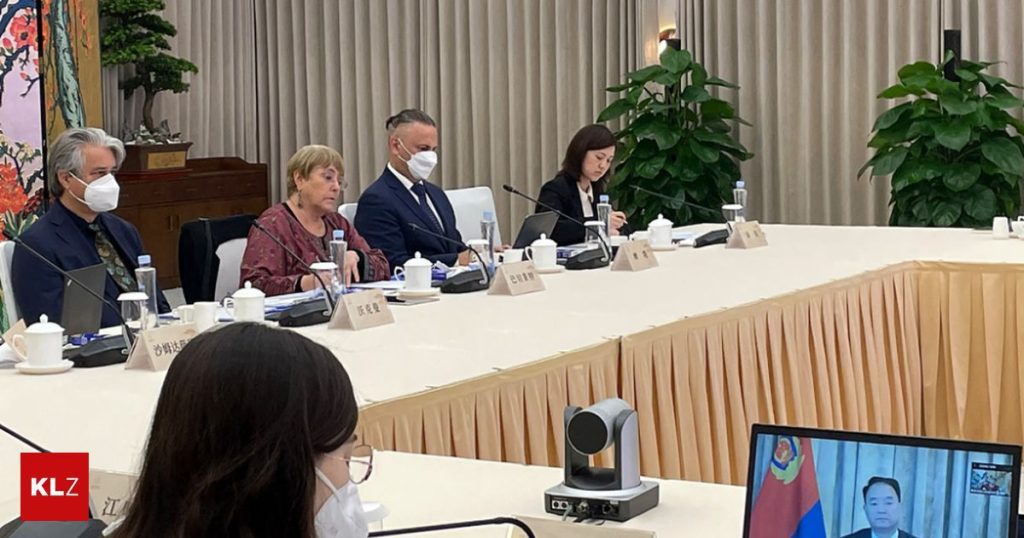Chez Bachelet replied, “Countries do not need specialized editors.” Although the United Nations already guarantees the universal legitimacy of human rights, Xi Jinping has reiterated the Chinese position that the different paths of each country must be respected. “Human rights have a historical, specific and practical context.” With different national conditions, history, cultures, social systems and levels of economic and social development, countries need to explore the appropriate course of human rights, Xi put the importance into proper perspective.
With the former Chilean president, there is a UN human rights commissioner in China for the first time in 17 years. Bachelet also plans to visit Xinjiang in northwest China this week, where human rights activists say hundreds of thousands of Uyghurs and members of other minorities have been placed in re-education camps and subjected to forced sterilization and forced labour. China denies the accusations, calling them “the lie of the century”. The day before, however, new international media revelations of a data leak called “Xinjiang Police Files” caused an uproar, showing the extent and severity of the mass persecution and detention of Uyghurs and members of other minority groups in Xinjiang.
According to state broadcaster CCTV, Xinjiang was not named in the video conference held by Xi and Bachelet. Accordingly, Xi said in an interview with Bachelet that there is no “perfect nation” when it comes to human rights. Apparently citing recent critical statements from the United States and the United Kingdom, Xi said there was “no need for a ‘teacher’ to run other countries.”
Speaking to Xi, according to CCTV, Bachelet said the UN human rights office wants to “intensify its cooperation with the Chinese side” and “make joint efforts to advance the development of human rights globally.” “I admire China’s efforts and achievements in eradicating poverty, protecting human rights and achieving economic and social development,” according to China’s state-run TV station, Bachelet said while talking to Xi.
Human rights organizations as well as the US government question that Bachelet was given free and unmonitored access to the camps, detention centers and their inmates during her visit to Xinjiang so that she could make an independent and impartial assessment.
The US government was shocked by the recent revelations of human rights abuses in Xinjiang. An international media consortium had earlier published further evidence of the mass internment of Muslim Uyghurs in Xinjiang. Pictures, speeches, and instructions from the authorities there proved, among other things, torture and an order to shoot.
After new reports about the brutal suppression of the Muslim Uyghur minority in China, the German government has confirmed that Germany will distance itself further from the communist regime in Beijing. Although the People’s Republic of China is a major trading partner, there are “very important problems”, including with regard to human rights, explained Vice Chancellor and Minister of Economy Robert Habeck. “It’s been hidden for years.”
Austrian Foreign Minister Alexander Schallenberg (ÖVP) said the images and information from Xinjiang “that we are receiving are frightening.” “It (…) should not (…) be swept under the rug. You have to have a clear view of it here, and the European Union has addressed the situation or has repeatedly in the past and taken a very clear position,” Schallenberg told Radio Mittagsjournal. ORF Ö1, the position on this and of course still applies.He called for “unrestricted access” to Bachelet when she visits Xinjiang.
The Chinese leadership accuses Uyghurs in the region of separatism, extremism and terrorism, while the Muslim minority feels political, religious and cultural oppression. After taking power in 1949, the Communists incorporated the former East Turkestan into the People’s Republic.

“Food practitioner. Bacon guru. Infuriatingly humble zombie enthusiast. Total student.”








More Stories
Kyiv: Russian Kursk offensive halted
US Presidential Election: Former US Government Officials Warn Against Donald Trump's Election
Netherlands wants to leave asylum system